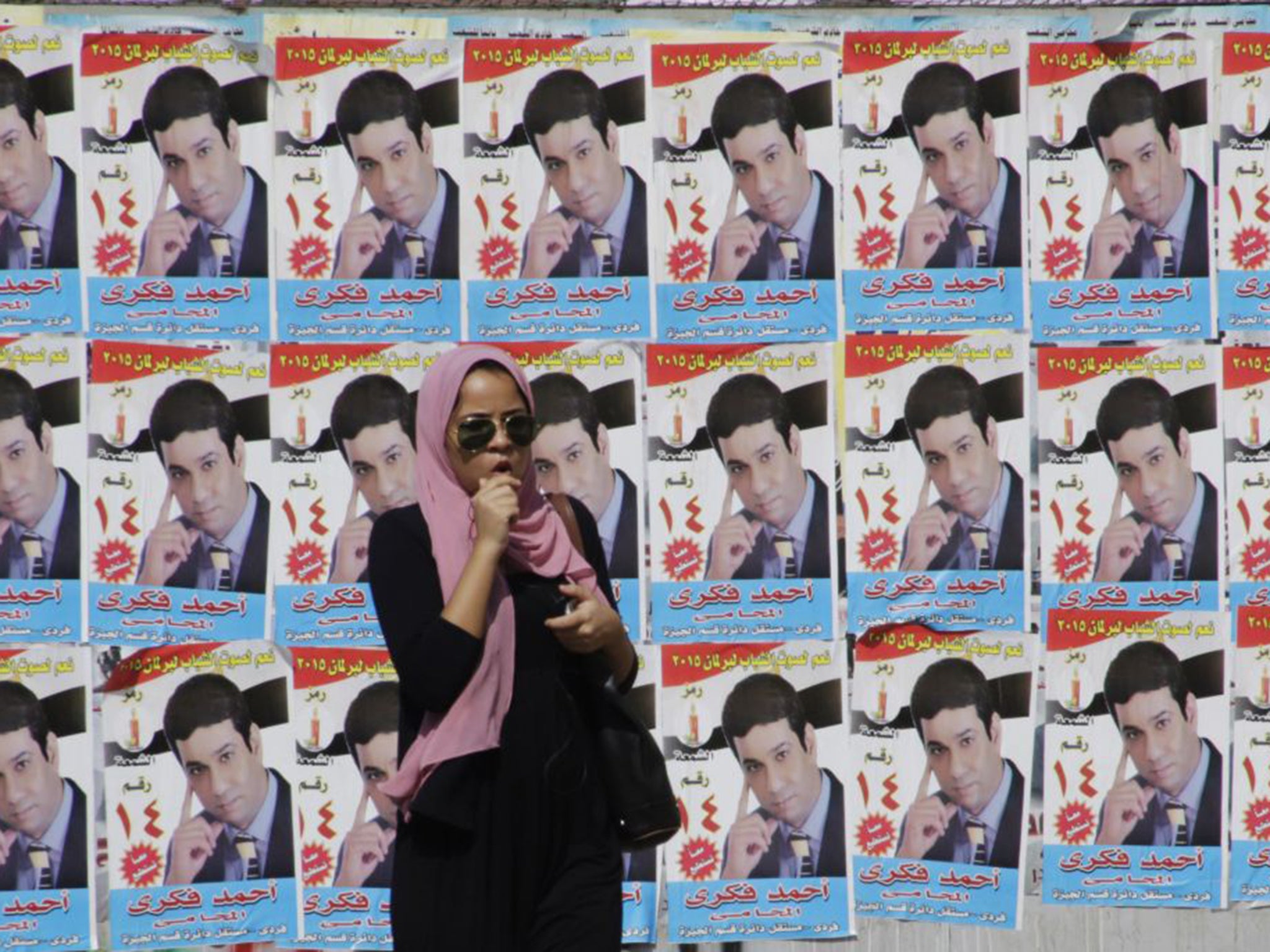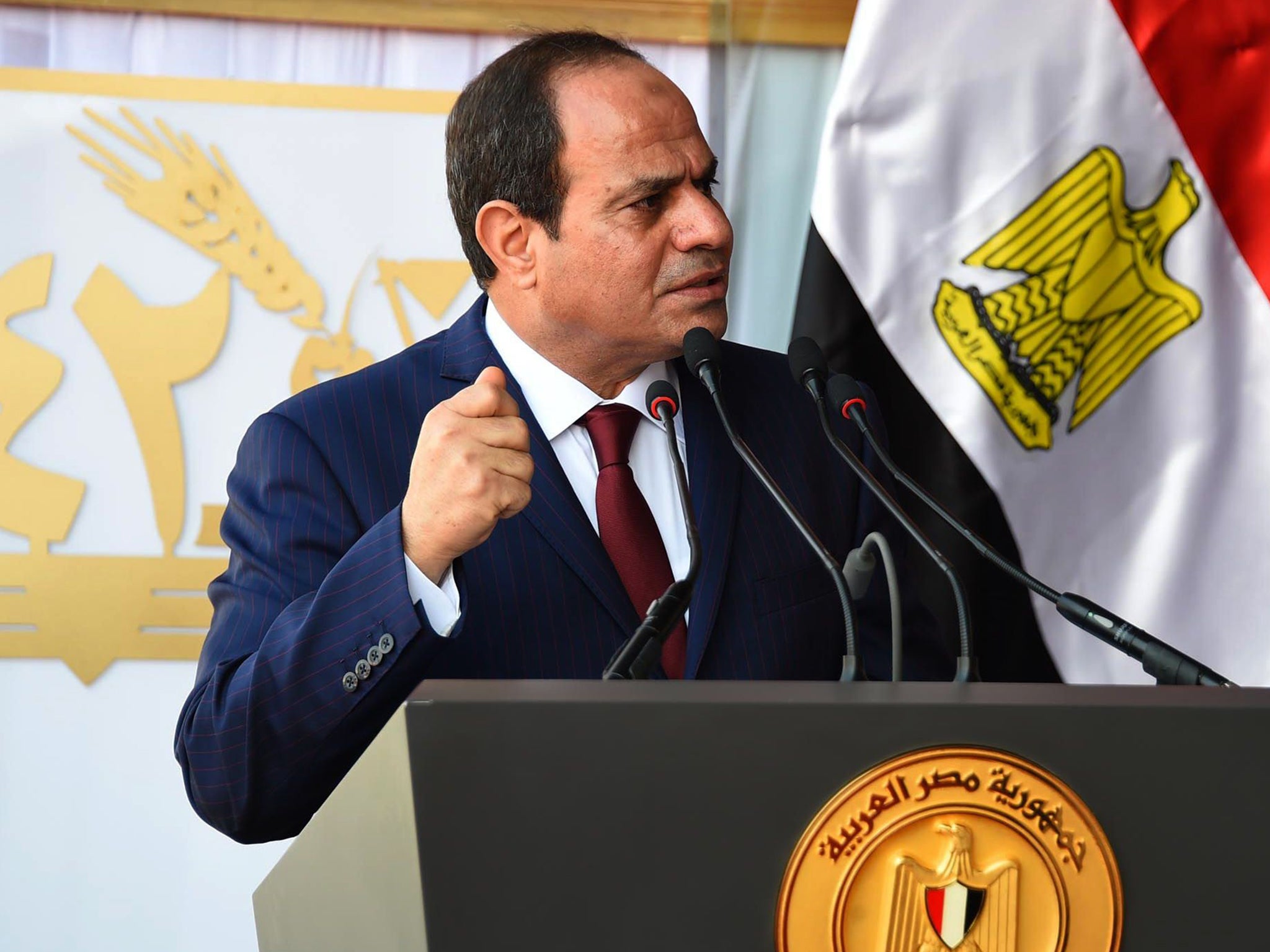Egypt goes to the polls with voter apathy expected to produce low turnout
The election is supposed to be the final stage in President Abdel Fattah al-Sisi’s 'roadmap to democracy'

Your support helps us to tell the story
From reproductive rights to climate change to Big Tech, The Independent is on the ground when the story is developing. Whether it's investigating the financials of Elon Musk's pro-Trump PAC or producing our latest documentary, 'The A Word', which shines a light on the American women fighting for reproductive rights, we know how important it is to parse out the facts from the messaging.
At such a critical moment in US history, we need reporters on the ground. Your donation allows us to keep sending journalists to speak to both sides of the story.
The Independent is trusted by Americans across the entire political spectrum. And unlike many other quality news outlets, we choose not to lock Americans out of our reporting and analysis with paywalls. We believe quality journalism should be available to everyone, paid for by those who can afford it.
Your support makes all the difference.The town of Burtus, just north of Cairo, is a network of unpaved streets, now decorated with black, white and red election banners. The faces of the candidates smile down amid the bustle of fruit sellers and the honking of car horns, as Egypt prepares to go to the polls on Sunday to elect its first parliament since President Abdel Fattah al-Sisi came to power.
“I’ve voted in every election we’ve had,” said Ali Mahmoud Essam, 39, an accountant who works in Cairo. Mr Essam said his priority for this election was new blood. “I don’t want the old regime to come back,” he said, in reference to former members of the National Democratic Party (NDP). Hosni Mubarak headed the NDP until his overthrow in the uprising of 2011 led to the party being disbanded, although many of the party’s old guard could return to parliament in new guises.
The election – which continues in phases until December – is supposed to be the final stage in Egypt’s “roadmap to democracy” implemented by Mr Sisi, having ousted the former Islamist president Mohammed Morsi in June 2013. Mr Sisi was later elected with 97 per cent of the vote.
However, with a voting system that favours individuals rather than parties – hundreds of seats in parliament will be filled by candidates not officially connected to any political group – critics say those with existing networks of power and influence, including many former members of the NDP, have an advantage.
On paper, MPs could act as a check on the president’s power: the 596-seat parliament has the power to impeach the President as well as debate the many decrees he has signed since his election in July last year – 175 at the last count. But with a parliament likely filled with Mr Sisi’s supporters, the chance of real debate looks slim. Mr Essam said he favoured a local candidate from the Al-Wafd Party, founded in 1923. He chose him as “he’s a bank manager, so he doesn’t need money. But he’s also ready to spend money to fix things”, he explains.
Al-Wafd is part of the “For the Love of Egypt” list, a bloc that encompasses six secular liberal parties and is headed by a former general, Sameh Seif al-Yazal. Espousing what could be seen as almost indistinguishable policies is the second “Egypt List”, headed by the former presidential candidate and political stalwart Ahmed Shafik.
“I’ve voted in every election we’ve had. I don’t want the old regime to come back”
With the Muslim Brotherhood – which had been a potent force – banned from running and with thousands of its leaders and members jailed, the only serious potential opposition comes from the politically isolated al-Nour Party and the Democratic Current list, the latter populated with ageing leftist figures such as the former presidential candidate Hamdeen Sabahi.
With a despondency around the prospects for the coming parliament, voter turnout is expected to be low – as was the norm before the 2011 revolution. However, some are hopeful for the new parliament’s potential, but as a traditional provider of municipal services, not democracy.

“I’m definitely voting – I want to see more jobs for young people,” said Ramadan Atayal, 24, frying sugary snacks on his cart in a teeming public square. Mr Atayal will vote in his home town of Beni Suef, in central Egypt. His chosen candidate is a former general. He pulled out his phone and displayed a photo of a flyer showing the candidate’s pledges: listed below religious devotion and choosing to spend religious holidays “among the people” are the words “I come from a famous family”.
Many analysts expect the new parliament to be too fragmented to challenge Mr Sisi, coalescing only through vague aims such as security and economic prosperity. “The parliament will represent the state’s needs – it’s for the executive rather than the people,” said Ahmed Morsy, a former fellow at the Carnegie Endowment for International Peace.
Dr Mohammed Anwar, 27, a surgeon in central Cairo, dismissed the election as “basically Kabuki theatre”. He said he had voted in parliamentary elections when there was hope following the 2011 revolution. But that hope has long since withered, and he now says he is not expecting much from this parliament and has no intention of voting.
“I’m enraged by the rhetoric used on public radio and TV, which says don’t vote for your personal gains, vote for Egypt’s wellbeing,” he said. “But isn’t a country at the end of the day its people? What else would they vote for, other than that?”
Join our commenting forum
Join thought-provoking conversations, follow other Independent readers and see their replies
Comments